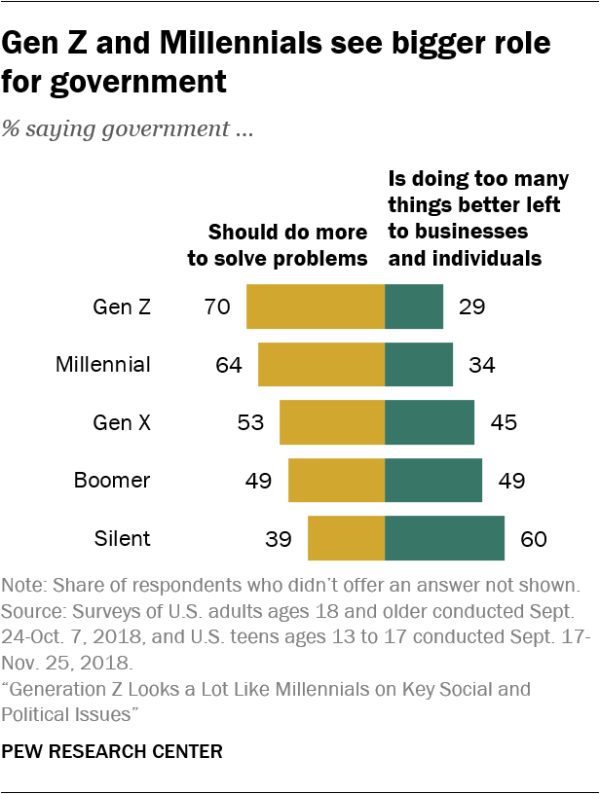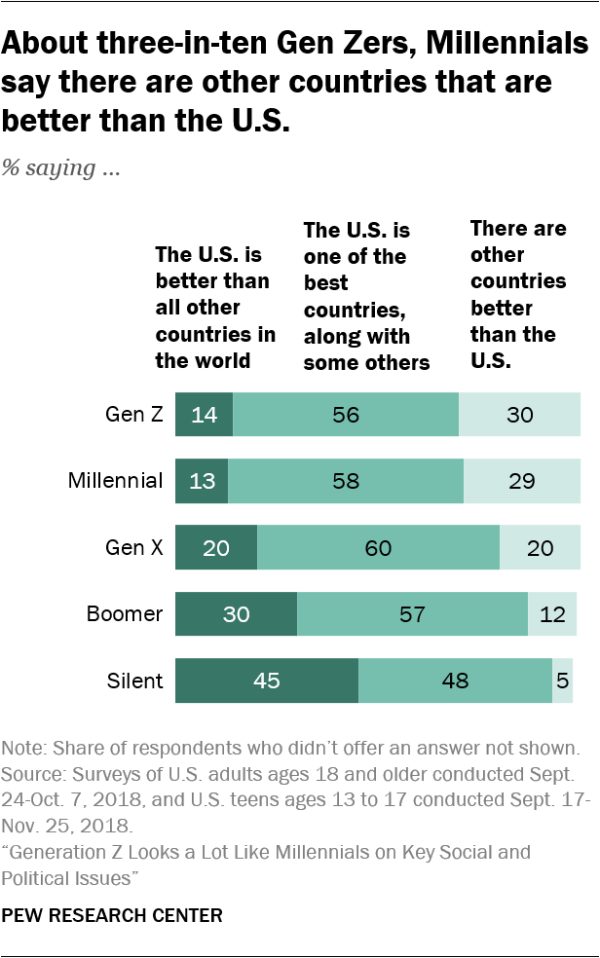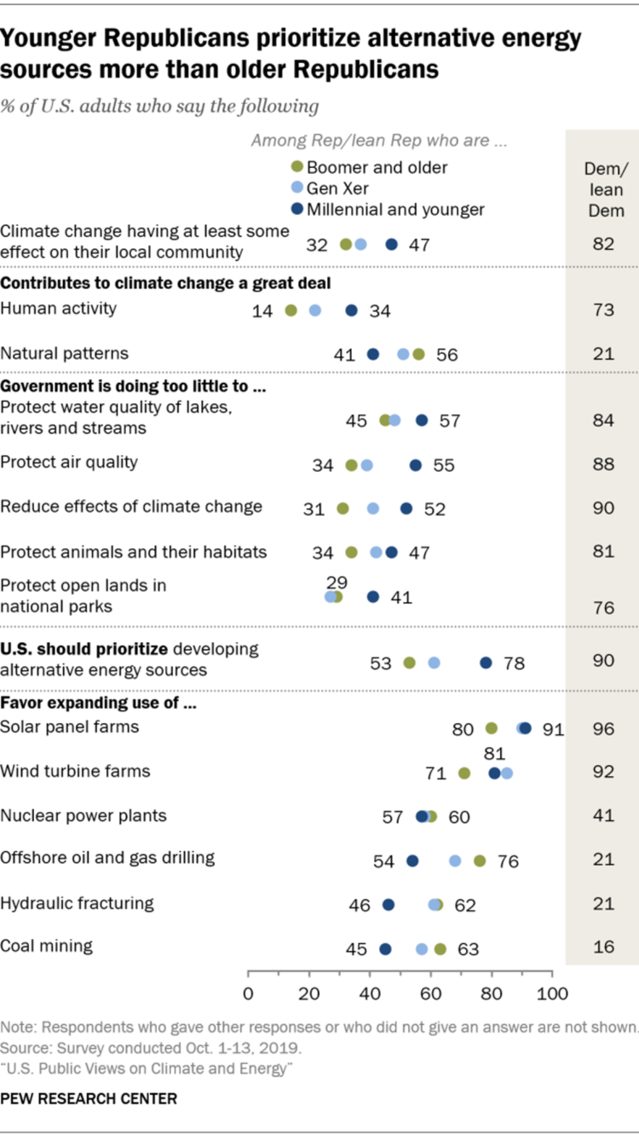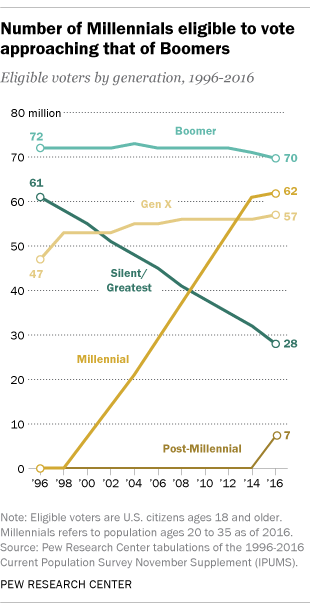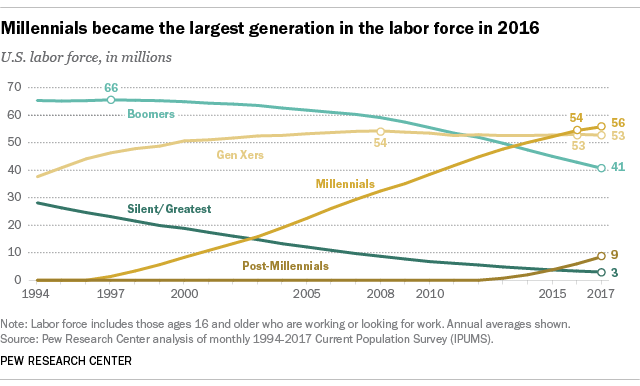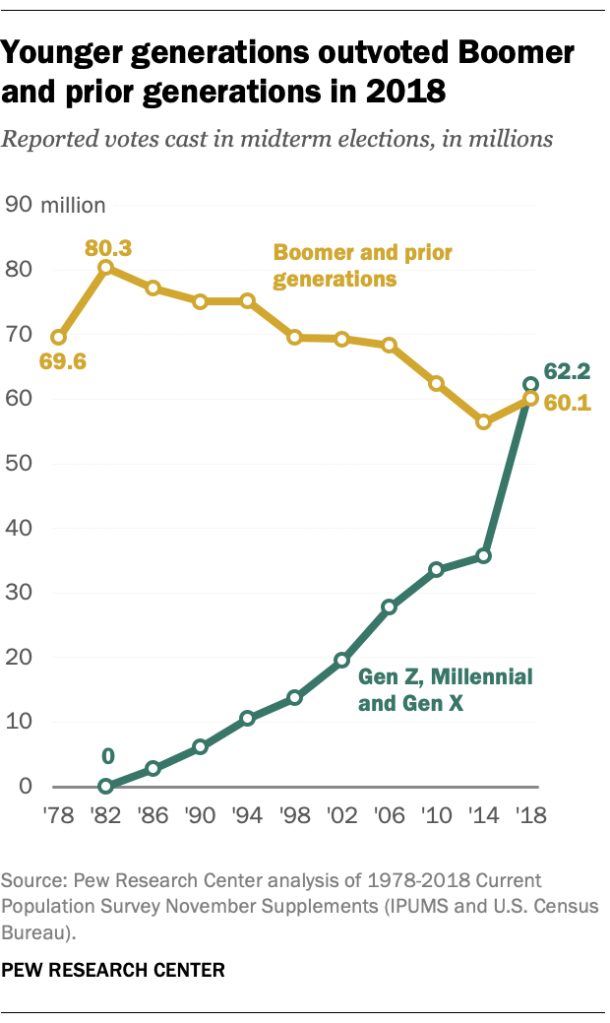Politics Is in the Midst of a Generational War
Photo by Joshua Lott/Getty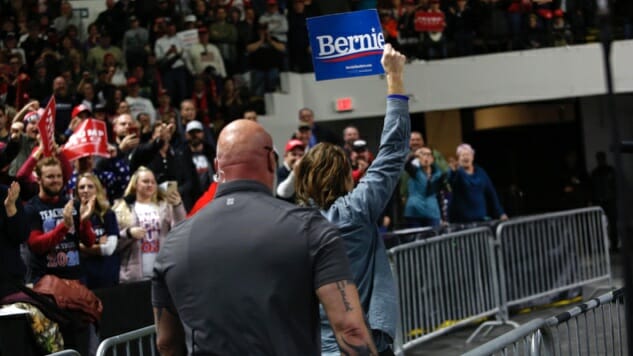
I’d like to open this column by noting that generations are a recent largely artificial political construct, and class is your primary determinant of where your political interests lie, but the polling on this issue is too stark to ignore. Something is happening. If it feels like politics is changing at the speed of light these days, that’s because it is. This poll below is really all you need to know about why there is so much momentum on the left flank of the Democratic Party.
Pew defines each generation as such, and so will we:
Gen Z: Born after 1996
Millennials: Born between 1981 and 1996
Gen X: Born between 1965 and 1980
Boomers: Born 1946 to 1964
Silent: Born 1928 to 1945
In general, there are two thrusts to this generational war initiated by millennials and gen Z, being driven along ideological lines and a general vision of what power truly is. This polling result reflects the latter.
In yesterday’s Quinnipiac poll, young ppl 18-34 are the only age group that cared more about policy ideas than being a “great leader.” pic.twitter.com/tXyUO1C3um
— Steadman™ (@AsteadWesley) May 1, 2019
Last week, Sunrise Movement, the coalition of young people dedicated to passing a Green New Deal, endorsed Bernie Sanders, stating that “We believe a Bernie Sanders Presidency would provide the best political terrain in which to engage in and ultimately win that struggle for the world we deserve.” Notice that the word “leadership” is absent from the first line of this endorsement, and the focus is placed on a “political terrain” that is fertile to “win” a Green New Deal. Policy is the key to winning the hearts of most of America’s youth, and policy is the thrust behind this endorsement. If Bernie Sanders came out tomorrow and said “I love billionaires and oil companies,” you can bet that Sunrise would be reconsidering their endorsement.
Much of conventional American political wisdom focuses on amorphous measures of leadership, and not the actual policy created by these immensely powerful publicly accountable servants. Barack Obama was a historically-skilled orator, and much of the assumption was that his words would translate to action. An ultimately disappointing eight years which saw the Democratic Party lose over a thousand seats proved that it took more than West Wing-style dramatism to pass meaningful policy, and with the election of President Trump, generations of young people saw their formative years coincide with the general repudiation of institutional authority.
I was born five years before the Berlin Wall fell in 1991. Since then, I have witnessed two of the three impeachments in U.S. history, the longest war in U.S. history, the largest attack on U.S. soil since Pearl Harbor, two Iraq Wars, the birth of the by-definition forever War on Terror, and the largest economic collapse since the Great Depression—all culminating in watching Donald freaking Trump destroy the GOP en route to defeating the hand-picked Democratic nominee. Millennials and gen Z place our central focus on creating new policy because we have grown up watching our institutions fail over and over and over again.
This is reflected in the stark generational contrast in Democratic primary polling, given that candidates like Joe Biden are explicitly promising a return to the policies of the past, versus candidates like Bernie Sanders, Elizabeth Warren and Andrew Yang who are aggressively championing ideas new to the established discourse of the last 40 years.
For example, the latest Morning Consult poll gives Bernie a +27% advantage versus Joe Biden among gen Z, and +19% among millennials. With gen Xers, that dynamic flips to Biden being +10% against Sanders, and Biden +27% amongst boomers. Sanders, Elizabeth Warren, and Andrew Yang amass 64% of gen Zers, and 60% of millennials, while only 41% of gen Xers and just 24% of boomers endorse these newer candidates.
On the whole, polling shows that older folks prefer a status quo politician in 2020, while younger folks do not. This poll from Pew is quite revealing as to how each generation looks at the effects of U.S. policy.
This generational war isn’t confined to the Democratic Party either, as young Republicans care far more about climate change than their older cohorts.
Millennials and gen Z are not only changing the ideological composition of our politics, but the basic mathematical electoral logic around it as well.
Millennials are overtaking our boomer parents as the largest generation in America, and America is looking more like us. Add in the fact that gen Z is just beginning to enter adulthood, and it seems that America’s sharp leftward shift is an inevitable matter of when, not if.
The world has never changed as quickly as it has in the last 30 years, so it should stand to reason that the generations raised in that timeframe would have worldviews that differ proportionally from the time before them, and that is what you see in poll after poll after poll. Ironically, the “new” ideas pushed by candidates like Elizabeth Warren and embraced by younger folks are not actually new. They are the ideas our more conservative parents espoused in their youth. Like Alexandria Ocasio-Cortez said, this fight is about “bringing the Party home.” Bernie Sanders and Elizabeth Warren are essentially New Deal Democrats whose policies reflect those which grew from the 1930s and 1960s. The ideological war in the party is about replacing the late 20th century neoliberal policy paradigm with one that reflects the generations which gave us Medicare and Social Security.
So much of our current fights stem from a generation of kids rejecting the world their parents delivered to them. A world defined by the largest existential threat to mankind’s existence in recorded history. A world defined by perpetual war. A world defined by 20% less earnings than our parents had at the same stage in their lives. There is no doubt that significant progress has been made since the 1960s because evolution is real, but the cost to produce much of it was our future. Much of our modern politics is simply an attempt to reclaim it.
Jacob Weindling is a writer for Paste politics. Follow him on Twitter at @Jakeweindling.
